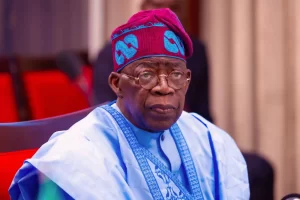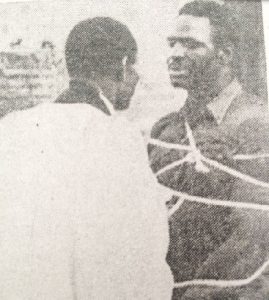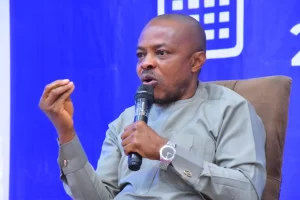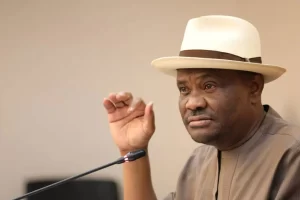Flashback News: SURAJ ‘MANSU’ ONATUGA: THE NIGERIAN VOLLEYBALL LEGEND

Suraj Olajide Onatuga could be well described as the icon, the legend or father of volleyball in
Nigeria. He joined the team as a player in 1972 (just 2 years after the association was formed in
the country), retired and took up coaching. Till now, he is still on the pitch, doing what he knows
how to do and inculcating same to the younger ones. Suraj has a devotion to and faith in
volleyball. He believes that volleyball must not die in Nigeria. He wants it to get back to its past
glory and become a household name like soccer.
In this chat with Banke Akinlaja, he went into memory lane of the achievements and challenges of the game. The first volleyball association in Nigeria was formed in 1964 and it was that of Lagos, which organised competitions among secondary schools and senior clubs based in Lagos. That of the defunct Western Region was formed in 1969.
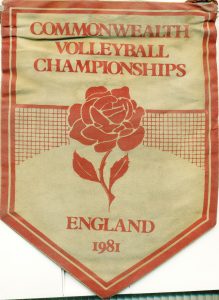
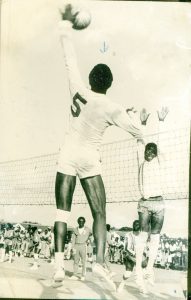
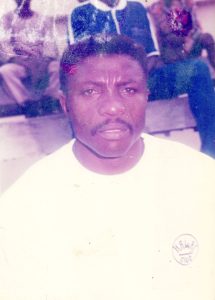
The Nigerian Volleyball Association was formed in 1970 with J.C. Omoruan as the first
chairman. The first Inter-state volleyball match in Nigeria was played in March 1968 between
Lagos and Western States at the Liberty Stadium.
Since 1968, Nigeria had organised many national competitions which comprised of Inter-club,
inter-state and league. These competitions were for both male and female categories.
In addition to national competitions, Nigeria continued to participate in many international
competitions and won laurels in some of them. The achievements from these competitions
have made volleyball popular in the country. The players that made these achievements
possible include: Ajiduah, Noibi, Oghuma, Suraju, Okoli, Asemota, Okolo, Oloyede, and a host of
others.
For Suraj Onatuga, popularly known as Coach Mansu in the volley ball circle, he is as old as
Nigeria volleyball association on the field save for one year. A native of Ijebu-Ode, Ogun State,
but born and brought up in Lagos, he obtained his secondary school education at Will College,
Isolo, Lagos, where he graduated in 1967. His parents, Mr. Nosiru Onatuga and Ramat Onatuga
were Ijebu. He is the last child of three boys. After leaving secondary school, Suraj played
football for a while. Late Muda Lawal was one of his team mates.
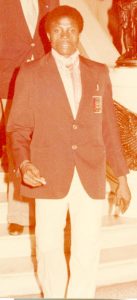
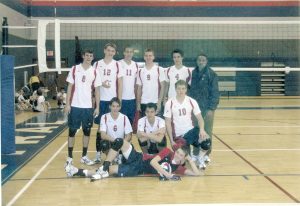
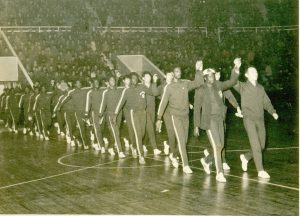
Then how come ‘Mansu’ came to be known in volleyball circle as against his first choice –
football and how did he join volleyball? He had this to say,
“In 1969, I joined the Nigerian Army on special enlistment as a footballer and a basketball
player. While in the army, I stopped playing football and focused on basketball. I played
basketball for the army for three years before I began playing volleyball. The man who
introduced me to the game was Late Patrick Okolo, the volleyball coach in Abalti Baracks, Lagos.
Due to the location and proximity of the volleyball and basketball courts at Abalti Barracks,
Patrick Okolo had the opportunity to watch and observe my movements on the pitch and in
early 1972, he advised me to switch to volleyball.
At first, I rejected his advice because I felt that volleyball was a woman’s game but his persistence and my respect for him enticed me to learn the game. To my greatest surprise, after six months of learning the game, I was invited to the national team camp to prepare for the 3rd All African Games in 1973 and that was my early history of volleyball.”
If Suraj had been in the volleyball team as early as 1972, just barely after the Nigeria
Volleyball Association was formed, he is therefore in the best position to tell the story of the
history of Volleyball in Nigeria. This he did gladly as he said,
“Nigeria started going to British Caledonia as far back as the 1960s, precisely 1965, before I
joined. We performed very well in the first British Caledonia I attended. In those days, when it
was not hard for Nigerians to get a British visa, the Nigerian volleyball team was invited every
year to play in British Caledonia. Upon getting to Britain, we were given free accommodation,
feeding and so on. Then, the naira had value and it could be used to purchase anything in
Britain, not now. The British would collect naira from you. Naira, in those days was equivalent
to one pound.
Nigeria was always invited to the Suez Canal Volleyball Competition in Egypt, almost every
year. There was another competition in Kuwait; it was the Afro-Arab Volleyball Championship.
There was frequent training tours to several countries to improve the standard of volleyball.
We travelled to China, Germany. In Cuba, we spent almost two months on training tour. We
travelled to Russia, and Italy and so on. These training tours paved the way for good Nigerian
volleyball players to play internationally.
Some played in England, Belgium, Italy, France, United
States, and so many other countries. Some of these players went to these countries for studies, played for their teams and even became their coaches. Examples of such players include Mr.Ibrahim Suberu, a product of Rowe Park Sports Centre, who played Under-18 for Lagos in 1965 during the first National Sports Festival. We have Edosa Aye (Cobnor); he played for Lagos and the Nigerian team before travelling to France. He is now a first division volleyball coach in France. There was Moyo Kazeem, a Nigerian who schooled in America and played for the USA.
In those days, unlike what is operating in the system now, we were always travelling either on training tours or for competition.
In fact, at a point players were always complaining of the frequent journeys away from home. In those days at National Stadium, Surulere, Lagos, volleyball tournament was always every month. We had so many companies that sponsored volleyball tournaments. For instance, Peak Milk, Pepsi-Cola and so on were always there to sponsor.
Before the All African Games in 1973, the first place we went on a training tour was Togo
(Lome). We were defeated by the Togolese national team. After this trip, we went to Egypt on a
training tour of 2 weeks but at the 2nd of All African Games, the Nigerian team did not win
anything because volleyball was just about 4 to 5 years old in Nigeria. In 1975, there was West
African Games. That was the first international medal for the Nigerian volleyball team. We won
the gold after defeating Togo in the finals. The West African Games comprised of Nigeria,
Republic of Benin, Republic of Niger, Burkina Faso, Togo, Ghana, Cote d’voire, Liberia, Senegal,
Mali and Chad. The West African Games of 1975 took place in Lagos. We played our semi-final
match with Guinea and our finals with Togo.
In 1977, there was another West African Games here in Lagos, this was because of our
wealth and strength, where we defended and won our title as West African Volleyball
Champions. Between 1975 and 1977, there was a friendly competition between Nigeria and
Ghana in which Ghana’s volleyball team visited Nigeria and we went to Ghana for the return
leg.
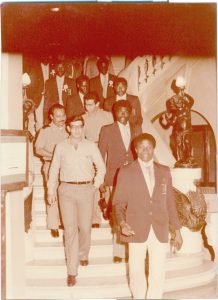
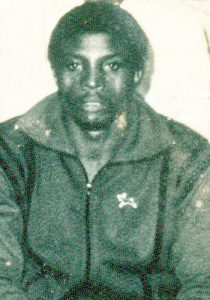
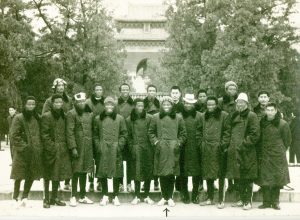

After West African Games in 1975, Nigeria’s volleyball team became the best in West Africa.
This was a huge achievement because Nigeria was able to surmount the French-speaking
countries who were the originators of volleyball in Africa. The French-speaking countries of
Togo, Benin Republic, Chad, Burkina Faso, Cote d’Voire had been playing volleyball for over 20
years before Nigeria began to play the game.
At the All African Games in Algeria in 1978, Nigeria reached the finals after defeating the host
country in the semi-finals. It was a game nobody wanted to remember. This was because at the
finals, Nigeria was leading and well ahead of Tunisia. As a matter of fact, it was getting close to
the end of the match and everybody was very sure that the cup would go to Nigeria. Some
people had even concluded that the match had ended and had already left the field waiting to
hear the announcement that Nigeria had won. However, unfortunately, Tunisia defeated
Nigeria.
“There was also the Commonwealth Volleyball Championship in 1981 and to my knowledge
that was the only Commonwealth volleyball championship. It was comprised of so many
countries such as Bahamas, India, Canada, England, Kenya, and Nigeria and so on. Fortunately
for us, Nigeria qualified for the finals. We defeated Australia in the semi-finals, in quarter-finals
we humbled India and we played against Canada in the finals.
Nigeria was the only country that gave Canada a tough match, unfortunately Canada defeated Nigeria in the finals.
Asked if he still remembered the players in the national team before and during his time,
Suraj explained that he remembered some of them, only that most of them have long retired.
from volleyball.
“The first person I will mention was the late Dr.Ajiduah. He was the first Nigerian national
captain. The first national coach during Ajiduah’s time was a whiteman and he took Ajiduah
back with him to his country where he studied and stayed for some years before coming back
to Nigeria to become a lecturer. Bola Yusuf was another player and also the second captain.
There was also Tony Ogwuma from Edo State, who captained the national team for so many
years and was the captain of the team at the time we went to the 1981 Commonwealth Games.
Usman Abdullah Kano captained the national team too, for so many years. He played and
coached in Kuwait for so many years. Thomas Aroko was also there before moving to France
where he played for many years. Another person that came to mind was Taiwo Noibi. These are
some of the pioneers of volleyball that came to mind. Of the pioneer players, I am the only one
remaining in the game.
Suraj joined the national team in 1972 as a player for 16 years, before he retired in 1988. He
became the national coach of Nigerian national volleyball team in 1989 and coached them for
15 years, before retiring in 2004. During his time as a player and as the national coach, Nigeria
won several laurels and the standard of volleyball was improved.
“I played for the national team from 1972 to 1988 when I retired and I was the national
volleyball coach from 1989 to 2004. I left the army in 1977, after the All African Games in
Algeria, I joined the Lagos State Sports Council as a volleyball coach. All in all, I dedicated over
30 years of my life as a player and as a coach by representing my country in various
competitions and winning laurels and prestige for my country”. Although he joined the Lagos
State Sports Council as a coach, he was also made a national coach.
Having retired as a player with a bigger challenge of tutoring other players as a national
coach between 1989 and 2004, Suraj gave account of his stewardship in volleyball. “I retired as
a player in 1988 and became the national coach in 1989. In 1989, I took the national team to
Cote d’Voire to play an African volleyball competition. However, Nigeria did not do well. “
“In 1991, at the All African Games in Cairo, Nigeria had the best volleyball team but they gave
the worst performance ever. The All African Games in Cairo was the best but they performed
woefully. This was because of the conflict over competition allowance. Nigeria then separated
the international players invited from overseas from the local players and paid the international
players special allowance. When the local players got to know of the unequal allowance, they
felt cheated because the local players were the majority.
While there were eight local players, international players were four (two from France and two from Belgium). The four international players were: Moyo Kazeem and Nnamdi from France while Wasiu Ojuolape and Tunde Omisore were from Belgium. Some of the local players were Sanni Muhammad, Usman
Abdullah, late Shadrack Palmer, Tayo Oguntana and others. The blame for this conflict could be
placed on the organising secretary. She was not discreet as she publicly gave the international
players their allowance with the amount written boldly on the envelope after a match with
Kenya.”
In the All African Games in 1995 in Cairo, Nigeria presented a good volleyball team and for
the first time, the team defeated Egypt 3-1 at the semi-finals. Unfortunately, the team played
Cameroon in the finals and lost 3-2.
There was also the All African Games at Abuja in 2003, where the male team won silver after
losing to Egypt in the finals.
In 2004, Suraj retired as the national coach and moved to the USA His last assignment before
retirement in 2004, was when he took the team to the Olympic qualifiers in Tunisia. The team
did not do well probably because they arrived Tunisia two days after the opening ceremony and
were walked over twice.
What did he do after retirement as the national coach? Onatuga said, “I went to United State
of America in 2002 for a nine month coaching course where I undertook a study of coaching
and playing system, one month each at different universities. I later coached one of the clubs –
Sports Performance Club.
Volleyball started from America who were the Olympics and world champions of volleyball. I
spent four years in the United States. After my nine months coaching attachment programme, I
came back to Nigeria and that same year, I took the national team to the All-African Games in
2003 where we won a silver medal. I took the national team to Tunisia for the Olympic
qualifiers in 2004. After this, I handed in my resignation letter and migrated to the US where I
became a coach of the Sports Performance Club. I was there till 2006 before I came back finally.
“While coaching Sports Performance in the USA, I took the junior male team to the US
National Club Volleyball Championship where there was competition among more than 80
volleyball teams for a single cup in 2005 and won the cup. In the same 2005, my girls or female
team won a silver medal in a national championship.
“There were a lot of tournaments where I coached the boys team about to be admitted to
the university and likewise the girl’s team. I also coached the under-12 team or youth team.
However, while at the club, I worked part-time because I was not a citizen and I did not have
resident permit. I went there to work and earn salary. I had a lot of achievements especially in
2005 and 2006 before I left. But my biggest achievement in my entire volleyball coaching career
both in Nigeria and the United States was winning the U.S.A National Club Volleyball
Championship for the “Sports Performance Club. It was the biggest in the sense that there were
over 90 clubs competing for one prize and one had to play 20 matches or more to get the
number one title. So I count that National Club Championship as my biggest achievement.”
I worked with Lagos State Sports Council for many years and I know it is better for me to stay
where I am needed and wanted.
I had previously coached the national team for 15 years and
when I came back from the U.S, I felt that I would be of better benefit to the development of
volleyball by coaching the younger ones. I am comfortable working with Lagos State because
the Commissioner of Sports that I am working with knows my abilities, he knows what I can do
and what I have been doing to develop volleyball in the state. He gives me free hands to do
what I can do to popularise and develop the game. At present, there are more than twenty
secondary schools that registered with us to train their students in volleyball. Lagos State Sports
Commission believes in me and I will do my best to justify that belief.
Suraj Onatuga is happily married with four children; 3 girls and 1 boy. Although his last child
and only son has just begun learning to play volleyball less than 6 months ago, he is making his
father proud and happy because he already plays like a professional.

